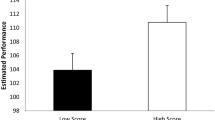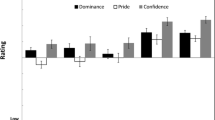Abstract
Expert or skilled behaviors (for example, face recognition or sporting performance) are typically performed automatically and with little conscious awareness. Previous studies, in various domains of performance, have shown that activities immediately prior to a task demanding a learned skill can affect performance. In sport, describing the to-be-performed action is detrimental, whereas in face recognition, describing a face or reading local Navon letters is detrimental. Two golf-putting experiments are presented that compare the effects that these three tasks have on experienced and novice golfers. Experiment 1 found a Navon effect on golf performance for experienced players. Experiment 2 found, for experienced players only, that performance was impaired following the three tasks described above, when compared with reading or global Navon tasks. It is suggested that the three tasks affect skilled performance by provoking a shift from automatic behavior to a more analytic style. By demonstrating similarities between effects in face recognition and sporting behavior, it is hoped to better understand concepts in both fields.



Similar content being viewed by others
References
Anderson, J. R. (1982). Acquisition of a cognitive skill. Psychological Review, 89, 369–406.
Beilock, S. L., & Carr, T. H. (2001). On the fragility of skilled performance: What governs choking under pressure? Journal of Experimental Psychology: General, 130, 701–725.
Beilock, S. L., & Carr, T. H. (2004). From novice to expert performance: Memory, attention and the control of complex sensorimotor skills. In A. M. Williams & N. J. Hodges (Eds.), Skill acquisition in sport: Research, theory and practice (pp. 583–616). London: Routledge.
Beilock, S. L., Carr, T. H., MacMahon, C., & Starkes, J. L. (2002a). When paying attention becomes counterproductive: Impact of divided versus skill-focused attention on novice and experienced performance of sensorimotor skills. Journal of Experimental Psychology: Applied, 8, 6–16.
Beilock, S. L., Wierenga, S. A., & Carr, T. H. (2002b). Expertise, attention and memory in sensorimotor skill execution: Impact of novel task constraints on dual-task performance and episodic memory. Quarterly Journal of Experimental Psychology, 55A, 1211–1240.
Brand, A. (2005). Explaining the verbal overshadowing effect. Unpublished PhD thesis, Cardiff University, Cardiff, UK.
Brown, C., & Lloyd-Jones, T. J. (2003). Verbal overshadowing of multiple face and car recognition: Effects of within- versus across-category verbal descriptions. Applied Cognitive Psychology, 17, 183–201.
Brown, C., & Lloyd-Jones, T. J. (2008). Verbal overshadowing of multiple face recognition: Effect on remembering and knowing over time. European Journal of Cognitive Psychology, 20, 456–477.
Bruce, V., & Young, A. (1986). Understanding face recognition. British Journal of Psychology, 77, 305–327.
DeCaro, M. S., Thomas, R. D., Albert, N. B., & Beilock, S. L. (2011). Choking under pressure: Multiple routes to skill failure. Journal of Experimental Psychology: General, 140, 390–406.
Dodson, C. S., Johnson, M. K., & Schooler, J. W. (1997). The verbal overshadowing effect: Why descriptions impair face recognition. Memory and Cognition, 25, 129–139.
Evans, J. S. B., & Stanovich, K. E. (2013). Dual-process theories of higher cognition advancing the debate. Perspectives on Psychological Science, 8, 223–241.
Fallshore, M., & Schooler, J. W. (1995). Verbal vulnerability of perceptual expertise. Journal of Experimental Psychology: Learning, Memory, and Cognition, 21, 1609–1623.
Flegal, K. E., & Anderson, M. C. (2008). Overthinking skilled motor performance: Or why those who teach can’t do. Psychonomic Bulletin & Review, 15, 927–932.
Hills, P. J., & Lewis, M. B. (2007). Temporal limitation of Navon effects on face recognition. Perceptual and Motor Skills, 104, 501–509.
Leavitt, J. (1979). Cognitive demands of skating and stick handling in ice hockey. Canadian Journal of Applied Sport Sciences, 4, 46–55.
Lewis, M. B. (2006). Eye-witnesses should not do cryptic crosswords prior to identity parades. Perception, 35, 1433–1436
Lewis, M. B., Mills, C., Hills, P. J., & Weston, N. J. (2009a). Navon letters affect face learning and face retrieval. Experimental Psychology, 56, 258–264.
Lewis, M. B., Seeley, J., & Miles, C. (2009b). Processing Navon letters can make wines taste different. Perception, 38, 1341–1346.
Macrae, C. M., & Lewis, H. L. (2002). Do I know you? Processing orientation and face recognition. Psychological Science, 13, 194–196.
Melcher, J. M., & Schooler, J. W. (1996). The misremembrance of wines past: Verbal and perceptual expertise differentially mediate verbal overshadowing of taste memory. Journal of Memory and Language, 35, 231–245.
Navon, D. (1977). Forest before the trees: The precedence of global features in visual perception. Cognitive Psychology, 9, 353–383.
Perfect, T. J. (2003). Local processing bias impairs line-up performance. Psychological Report, 93, 393394.
Perfect, T. J., Dennis, I., & Snell, A. (2007). The effect of local and global processing bias on eyewitness identification performance. Memory, 15, 784–798.
Perfect, T. J., Weston, N. J., Dennis, I., & Snell, A. (2008). The effects of precedence on Navon-induced processing bias in face recognition. Quarterly Journal of Experimental Psychology, 61, 1479–1486.
Rouder, J. N., Morey, R. D., Speckman, P. L., & Province, J. M. (2012). Default Bayes factors for ANOVA designs. Journal of Mathematical Psychology, 56, 356–374.
Rouder, J. N., Speckman, P. L., Sun, D., Morey, R. D., & Iverson, G. (2009). Bayesian t tests for accepting and rejecting the null hypothesis. Psychonomic Bulletin & Review, 16, 225–237.
Schooler, J. W. (2002). Verbalisation produces a transfer inappropriate processing shift. Applied Cognitive Psychology, 16, 989–997.
Schooler, J. W., & Engstler-Schooler, T. Y. (1990). Verbal overshadowing of visual memories: Some things are better left unsaid. Cognitive Psychology, 17, 36–71.
Schooler, J. W., Fiore, S. M., & Brandimonte, M. A. (1997). At a loss from words: Verbal overshadowing of perceptual memories. In D. L. Medin (Ed.), The psychology of learning and motivation (pp. 291–340). San Diego, CA: Academic Press.
Shiffrin, R. M., & Schneider, W. (1977). Controlled and automatic human information processing II: Perceptual learning, automatic attending and a general theory. Psychological Review, 84, 127–189.
Smith, M. D., & Chamberlin, C. J. (1992). Effect of adding cognitively demanding tasks on soccer skill performance. Perceptual and Motor Skills, 75, 955–961.
Weston, N. J., & Perfect, T. J. (2005). Effects of processing bias on the recognition of composite face halves. Psychonomic Bulletin & Review, 12, 1038–1042.
Author information
Authors and Affiliations
Corresponding author
Rights and permissions
About this article
Cite this article
Lewis, M.B., Dawkins, G. Local Navon letter processing affects skilled behavior: A golf-putting experiment. Psychon Bull Rev 22, 420–428 (2015). https://doi.org/10.3758/s13423-014-0702-6
Published:
Issue Date:
DOI: https://doi.org/10.3758/s13423-014-0702-6




